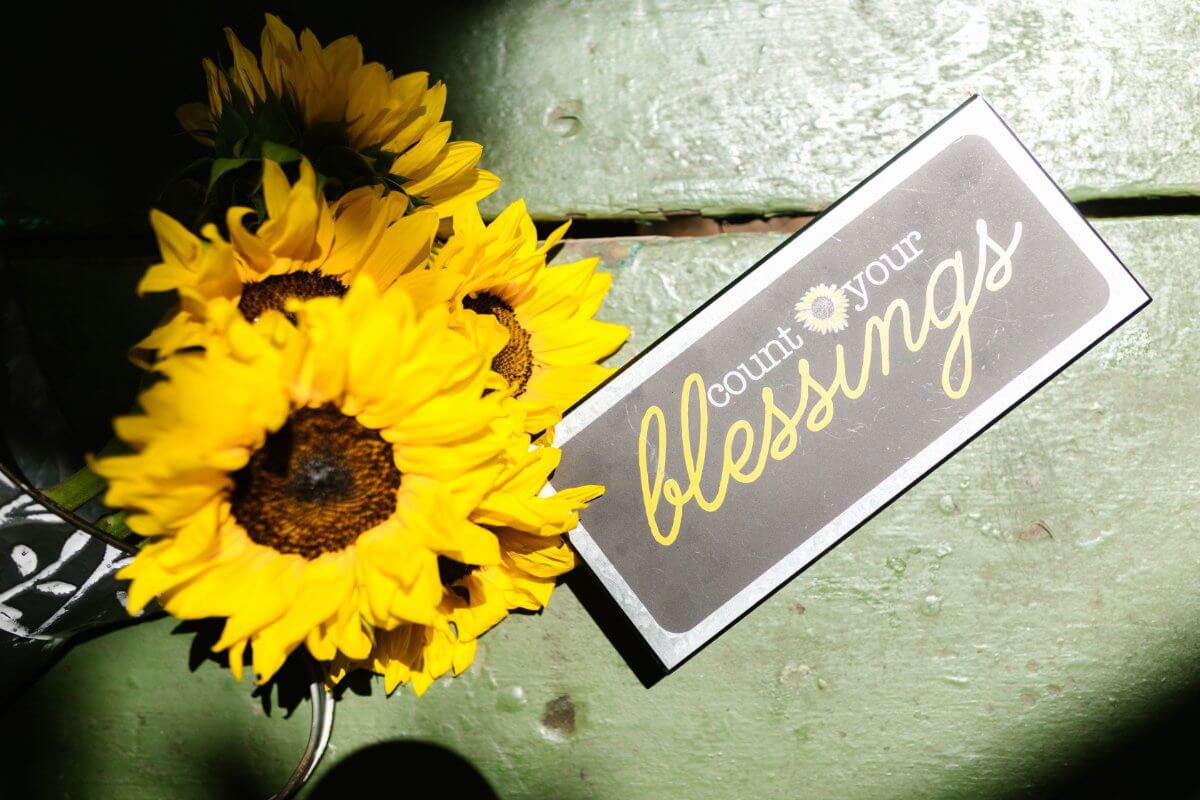Have you ever paused to consider what truly makes you feel fulfilled? Could the secret to a happier, more content life be as simple as practicing gratitude?
Let’s delve into what gratitude really means, its significance, and how it can transform our daily lives.
Table of Contents
What Is Gratitude – Its Meaning & Definition
Gratitude. It’s a word we hear often, but what does it truly mean?
At its simplest, gratitude is a profound appreciation for the good things in life. It’s about recognizing and valuing the positive aspects, whether they’re big or small. It’s about taking a moment to acknowledge the beauty in a sunset, the comfort in a warm meal, or the love in a kind gesture.
But gratitude goes beyond merely acknowledging the good. It’s about feeling a deep sense of thankfulness and expressing it. It’s about acknowledging the role of others in our happiness and appreciating the interconnections that bring joy and meaning to our lives.
Gratitude isn’t just a fleeting feeling or a momentary acknowledgment. It’s a mindset, a way of life. It’s about shifting our focus from what’s wrong to what’s right, from what we lack to what we have. It’s about celebrating the present and embracing the goodness around us.
The beauty of gratitude is that it’s not dependent on our circumstances; it’s dependent on our perspective. Whether we’re going through good times or tough times, there’s always something to be grateful for. It’s about finding the silver lining, even in the darkest of clouds.
In essence, gratitude is about appreciating the abundance in our lives rather than focusing on scarcity. It’s about realizing that even in the midst of challenges, there are blessings to be found. And most importantly, it’s about expressing this appreciation, not just feeling it.

The History of Gratitude
The concept of gratitude has been a topic of interest and contemplation for centuries. Philosophers, religious scholars, and thinkers from different cultures and eras have delved into the profound depths of this virtue, exploring its significance and potential impact on human life.
In ancient times, gratitude was often intertwined with religious and spiritual practices. Many traditional prayers and rituals across cultures involve expressions of thankfulness to a higher power, reflecting a deep appreciation for life’s blessings.
The Greek philosopher, Epicurus, highlighted the importance of gratitude in achieving a happy and content life. He suggested that to live a fulfilling life, one must focus on simple pleasures and express gratitude for them. Similarly, the Roman philosopher, Seneca, emphasized the role of gratitude in strengthening relationships and fostering a sense of community.
In the 1950s, the study of gratitude took a new turn. With the advent of positive psychology, researchers began to investigate the potential health benefits of gratitude. Studies have suggested that expressing gratitude can lead to improved mental health, reduced stress, and even increased life satisfaction.
Signs of Gratitude
Gratitude is not just an abstract concept; it manifests in our daily lives in various ways. It can be as simple as a heartfelt “thank you” to a friend, a moment of silent appreciation for a beautiful sunrise, or a journal entry listing the things you are grateful for.
Gratitude is often spontaneous, arising naturally in response to positive experiences. However, it can also be cultivated intentionally. By making a conscious effort to focus on the positive aspects of life, we can train ourselves to feel more grateful.
Measuring Gratitude
Assessing your level of gratitude can be a deeply introspective process. It requires honest self-reflection and a willingness to acknowledge both the good and the challenging aspects of life. A set of introspective questions can be helpful in this regard.
For instance:
- How often do you express appreciation for the good things in your life?
- How do you respond to difficult situations – do you focus on the negative aspects, or do you try to find something to be grateful for?
- How do you treat the people who contribute to your happiness?
Reflecting on these questions can help you gauge your level of gratitude and identify areas for improvement. Remember, gratitude is not about ignoring life’s challenges but about finding the goodness amidst them.

Types of Gratitude
Gratitude, as we understand it, is not a one-dimensional concept. Rather, it can be seen as a trait, a mood, or an emotion, each with its own unique characteristics and implications.
When we talk about gratitude as a trait, we refer to it as a habitual way of thinking and behaving. It’s a deep-seated part of our personality, an innate tendency to recognize and appreciate the positives in our lives. People with a strong trait of gratitude are often more content and satisfied with their lives, regardless of their circumstances.
Gratitude as a mood, on the other hand, is a temporary state of mind. It’s a feeling that arises in response to a specific event or situation. For instance, you may feel a surge of gratitude when a friend helps you out in a time of need or when you witness a beautiful sunrise. This form of gratitude is fleeting, but it can have a powerful impact on our mood and well-being.
Lastly, gratitude as an emotion is a more intense and personal experience. It’s a deep, heartfelt response to kindness and generosity. It’s the warm, uplifting feeling you get when someone goes out of their way to make you feel special or when you reflect on the love and support you’ve received from your loved ones.
Gratitude & Positive Psychology – What Is the Connection?
The study of gratitude is a central theme in the field of positive psychology. This branch of psychology focuses on the positive aspects of human life, such as happiness, well-being, and personal growth. It aims to understand and promote the qualities that allow individuals and communities to thrive.
Gratitude, with its emphasis on appreciating the good in life, aligns perfectly with the goals of positive psychology. Research in this field has shown that practicing gratitude can boost our happiness, improve our relationships, and even enhance our physical health. It encourages us to focus on the positive, which in turn, promotes a more optimistic and resilient mindset.
Why Is It Important To Be Grateful?
The importance of gratitude cannot be overstated. Renowned psychologist Robert Emmons has conducted extensive research on this topic, and his findings are truly enlightening.
According to Emmons, gratitude has a profound impact on our physical and psychological health. It can lower blood pressure, improve immune function, and promote better sleep. On a psychological level, it can reduce symptoms of depression and anxiety, increase resilience, and enhance overall life satisfaction.
However, the benefits of gratitude extend beyond our personal well-being. It can strengthen our relationships, foster empathy, and encourage generosity. It can create a sense of community and interconnectedness, reminding us that we’re part of something bigger than ourselves.
Showing Gratitude and Appreciation: Practical Steps

We’ve defined what gratitude is and why it’s important. But how do we put it into practice? How do we cultivate this mindset of gratitude in our everyday lives? Here are some practical methods to help you express and nurture gratitude daily.
Keep a Gratitude Journal
One effective way to cultivate gratitude is by keeping a gratitude journal. This is a dedicated space where you can jot down the things you’re grateful for each day. It could be as simple as a warm cup of coffee in the morning, a compliment from a colleague, or the sound of your child’s laughter.
The act of writing down these moments of gratitude helps you to consciously acknowledge the good things in your life. It encourages you to focus on the positive, even on days when it seems like everything is going wrong. Over time, this practice can help to shift your mindset towards a more grateful and appreciative outlook.
Write a Gratitude Letter
Another powerful way to express gratitude is by writing a gratitude letter. This is a letter written to someone who has had a significant positive impact on your life, expressing your deep appreciation for them and their actions.
Writing a gratitude letter not only allows you to express your thankfulness but also strengthens your connection with the person you’re writing to. It’s a reminder to both of you of the positive impact you’ve had on each other’s lives.
Whether you choose to share the letter or keep it private, the process of writing it can be a profoundly moving and therapeutic experience. It can help you to appreciate the depth and breadth of the goodness in your life and the role others play in it.
Arrange Gratitude Visits
One of the most powerful ways to express gratitude is through personal visits, often referred to as “gratitude visits.” These are not just casual meet-ups or social calls; they are purposeful encounters where we take the time to express our sincere appreciation to someone who has made a significant impact on our lives.
A gratitude visit could be to a former teacher who inspired you, a friend who stood by you during tough times, or a family member whose love and support have been unwavering. It’s about taking a moment to step out of our busy lives and make a heartfelt effort to convey our thanks in person.
Such visits can be profound, both for the giver and the receiver, creating a deep emotional connection. They serve as a reminder of the positive influences in our lives and reinforce the value of our relationships.
Thank Someone Mentally
But what if we can’t express our gratitude in person? Are there other ways to cultivate this powerful emotion? The answer is a resounding yes. One such method is the practice of mentally thanking someone.
This internal process involves consciously acknowledging the contributions of others to our lives, even if we don’t express it directly to them. It could be a silent thank you to a co-worker for their support or a mental note of appreciation for a stranger who showed kindness.
By mentally thanking someone, we’re not just acknowledging their actions; we’re also acknowledging their impact on our lives. This practice helps us recognize the good in others and, in turn, cultivates a deeper sense of gratitude within ourselves.
Count Your Blessings
In the pursuit of gratitude, one of the most effective practices we can adopt is to consciously count our blessings. This isn’t about ignoring the difficulties or challenges we face, but rather, it’s about choosing to focus on the positive aspects of our lives.
Counting our blessings is a powerful exercise that helps us to recognize and appreciate the good things we often take for granted. It could be as simple as appreciating the beauty of nature, the warmth of the sun, the laughter of a loved one, or the taste of a delicious meal. It’s about acknowledging the small everyday things that bring us joy and comfort.
This practice encourages us to shift our perspective from scarcity to abundance, from lack to plenty. It helps us to see that even in the midst of difficulties, there are still many things to be thankful for. It’s about realizing that our lives are filled with blessings if only we take the time to notice and appreciate them.
Meditate
Meditation is another powerful tool that can help us cultivate a grateful mindset. Through meditation, we can learn to quiet our minds, focus our thoughts, and become more aware of the present moment. This increased mindfulness can help us to see the beauty and goodness that surrounds us every day.
Meditation can also help us to cultivate a sense of inner peace and contentment, which can further enhance our feelings of gratitude. By quieting the noise and distractions of the outside world, we can tune into our inner world and truly appreciate the abundance that exists within us.
Through regular practice, meditation can help us to foster a deep sense of gratitude that permeates our entire being. It’s not just about feeling grateful for the good things in our lives but also about cultivating a deep sense of appreciation for the very act of being alive.
Challenges to Gratitude
Embracing gratitude may sound simple enough, but it’s not always easy. We face several challenges that can hinder our ability to truly appreciate the blessings in our lives. Let’s take a moment to explore some of these obstacles and how we can overcome them.
One of the biggest challenges to gratitude is our natural tendency to focus on the negative. It’s easy to get caught up in what’s going wrong in our lives, what we’re missing, or what we wish we had. This negative bias can cloud our perception and make it difficult to see the good that’s right in front of us.
Another challenge is our fast-paced, busy lives. We’re often so caught up in the hustle and bustle of daily life that we forget to pause and appreciate the moment. We’re constantly chasing after the next big thing, forgetting to appreciate what we already have.
Additionally, societal expectations and comparisons can also hinder our gratitude. We live in a world where success is often measured by material possessions and achievements. It’s easy to feel like we’re falling short when we compare ourselves to others, and this can lead to feelings of dissatisfaction and ungratefulness.
Despite these challenges, it’s important to remember that gratitude is a choice. It’s a conscious decision to shift our focus from what we don’t have to what we do have. It’s about choosing to see the good in every situation, even when it’s not immediately apparent.
Conclusion
Understanding and practicing gratitude is a transformative process. Despite the challenges we may face in cultivating this mindset, the rewards are immeasurable. Gratitude has the power to shift our perspective, enhance our well-being, and enrich our lives in countless ways.
The journey to gratitude may not always be easy, but it’s certainly worthwhile. It’s about making a conscious effort to appreciate the abundance in our lives and express our thankfulness. As we continue to explore and practice gratitude, we’ll find that it becomes easier to see the good around us, even in the midst of challenges.
So, let’s choose gratitude. Let’s choose to see the good in every situation, to appreciate the blessings in our lives, and to express our thankfulness. Because, in the end, the more we practice gratitude, the more we have to be grateful for.





